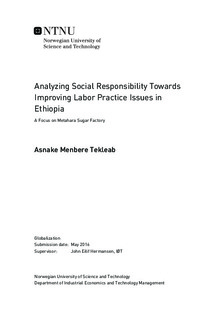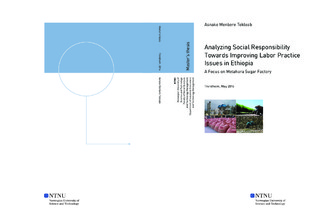| dc.description.abstract | Socially Responsible Labour Practices (SRLPs) are part of a nation-wide employment and social protection strategy prepared by the Ethiopian government aiming to ensure workers rights. However, there is a significant lack of focus on the development and implementation of the same. Therefore, the purpose of this study is to explore and examine the level of understanding and practical implementation of SRLPs in Ethiopia taking Metahara Sugar Factory as case study. The study employed mixed research methodology and case study strategy to examine the research agenda. Data was collected through both unstructured and semi-structured interviews and survey questionnaire with officials, experts and employees respectively. Personal observation and document analysis were also used as complements to strengthen the reliability and validity of the research.
Several important findings from this research are worth mentioning here. The research reveals that government, some large companies and their counterparts participate in socially responsible practices but their activities have only confined to philanthropic support. This implies the concept of social responsibility is not adopted to go beyond philanthropy and contribute in a sustainable manner. There are progressive individual company initiatives to implement socially responsible behaviours. However, the research identified gaps that impede the realization of this issue. The major impediments include, society s attitudinal problem and mistrust towards these companies, weak communication and lack of collaborative endeavour among various stakeholder towards the implementation of the same. The study also identified a wide ranging structural factors that affect SRLPs at macro level. These includes institutional and socio-cultural, labour market and enabling environment and broader policy and regulatory framework. At micro level, Metahara Sugar Factory employed a wide range of mechanisms (internal components) towards the management and implementation of labour practice issues. However, the inconsistent policies and strategies as well as lack of commitment, strong leadership and implementation capacity are internal factors that influence the execution of the five labour practice issues. The factory has superficial labour union led by workers representatives who are not committed enough to exert their at most effort to safeguard employees rights. Despite significant social, natural and financial capital assets, the factory has not translated these potentials to maintain fair labour practices throughout its supply chain. The research concludes the proportion of Metahara Sugar Factory s determination and engagement towards the implementation of the five labour practice issues shows low level of performance. It is logical to suggest that SRLPs should be integrated within the core business strategy of the factory that would ensure good working conditions, social dialogue, safety and security at work and respect for employee rights prevailed.
Keywords: Social Responsibility, Labour Practices, Issues, Implementation and Expectations, Ethiopia. | |

